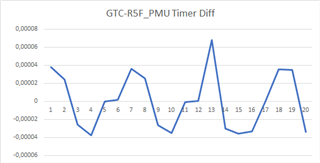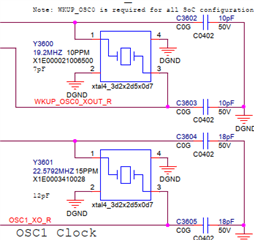Tool/software:
Hello,
Board: J784s4 custom board
PDK: 09.02.00.30
Linux
SPL Boot
To achieve it I have seen that following PLLs base clock oscillator have to be switched
PLL0 (MAIN PLL) -> MAIN_PLL0_HSDIV6_CLKOUT -> GTC Timer
PLL8 (ARM0 PLL - A72 cluster 0)
PLL9 (ARM1 PLL - A72 cluster 1)
PLL14(R5FSS PLL - R5F main domain)
Our current setup is, that at in the MCU 1_0 firmware the MAIN domain PLL's are initialized by the assistant of the sciclient -> running at the default HFOSC0
Afterward the registers of the concerning PLLs are modified with:
-> enable HFSOC1 oscillator
-> disable PLL0, PLL8 and PLL9.
-> switch base oscillator to hfsoc1
-> adjust gain to get from 22579200Hz to 2GHZ
-> enable PLLs again and wait for LOCK.
( "packages/ti/drv/sciclient/src/rm_pm_hal/pm/soc/j784s4/clocks.c")
Following routine, located at ("packages/ti/drv/sciclient/src/rm_pm_hal/pm/drivers/clock"), is responsible to setup the PLLs depending
static u32 clk_pll_16fft_internal_set_freq_from_pll_table(struct clk *pll_clk, struct clk *div_clk, const struct pll_data *pll_data_t, u32 target_hz, u32 min_hz, u32 max_hz, sbool query, sbool *changed)
If yes do you have any patch or some tips what have to be done?
Kind Regards
Thomas Willetal



